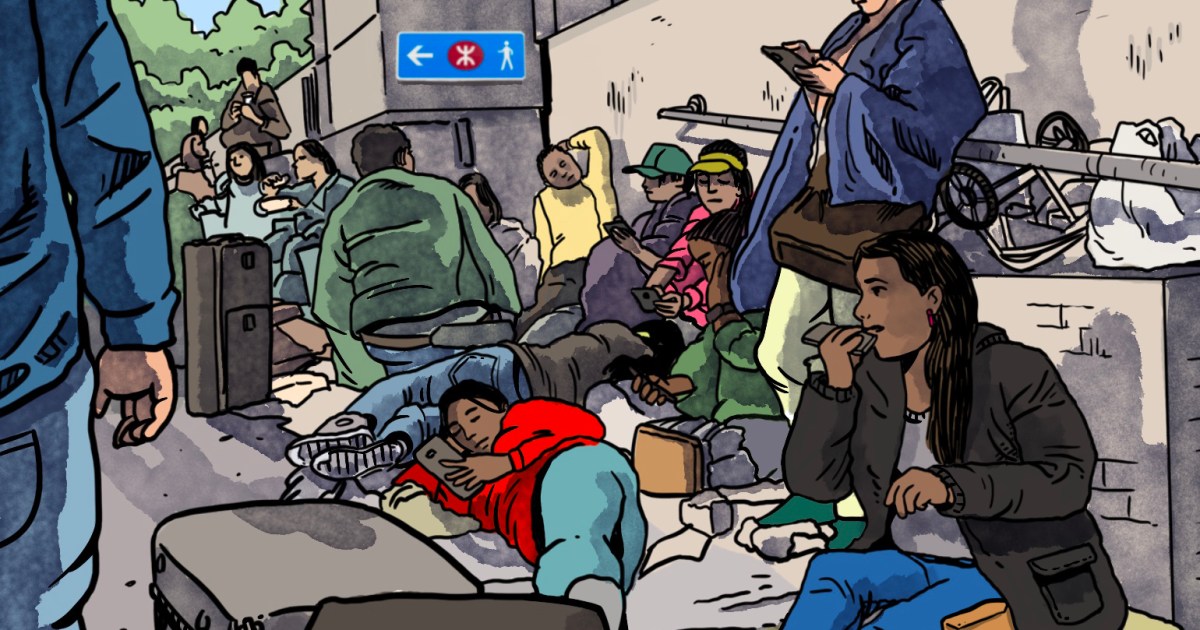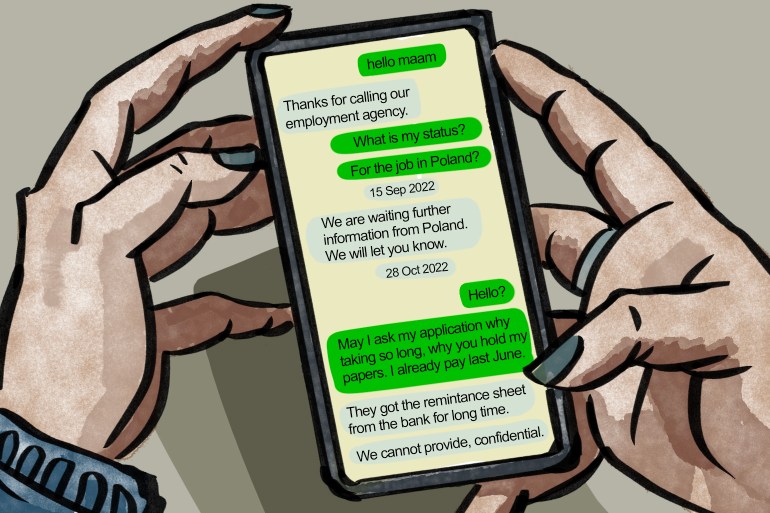
This is the second article in a two-part series on the alleged exploitation of Filipino migrant workers.
Hong Kong, China – Searching online for Divina*, a domestic worker in Hong Kong, only took a few minutes to find a recruiter who offered the tempting opportunity to work in Poland.
Soon, Divina was attending a two-hour orientation session on the 17th floor of a building in the busy Mong Kok district.
There, she listened as agents listed job openings in workplaces ranging from hotels to a chicken processing plant to an auto parts factory.
“So you would really be convinced of that [they] “I had a lot of contacts in Poland,” she told Al Jazeera.
Divina paid recruiters 10,000 Hong Kong dollars ($1,279) to initiate her application for a job in Europe.
But more than 14 months later, Divina is still waiting for her application to be completed and has all but given up hope of ever getting to Poland.
Divina is one of at least dozens of domestic workers in Hong Kong who feel cheated after paying thousands of dollars in fees for jobs in Poland that didn’t materialize.
Labor advocates in the financial hub say victims of an international network of recruiters and agencies lost at least 600,000 Hong Kong dollars ($76,785) – but that may be just the tip of the iceberg.
Al Jazeera spoke to five Filipino domestic workers in Hong Kong and read written statements from 20 others who claim they were deceived by online recruiters and at least two agencies in Hong Kong that worked with a Poland-based agency.
Many said they had been unable to feed their families for months after taking out loans to cover recruitment fees.
According to David Bishop, such cases are far from unique in Hong Kong, which has become a “hotbed for illegal recruitment schemes” due to its 340,000 foreign domestic workers and growing demand for migrant workers from Asia to Eastern Europe. University professor and co-founder of the migration-oriented social enterprise Migrasia.
Bishop said his team has identified a large number of agencies pursuing recruitment strategies in third countries that are banned by Philippine labor authorities.
“These agencies target Filipino workers in Asia with the alleged intention of finding them jobs in Europe,” he told Al Jazeera, adding that recruiters exploit the desperation of people hoping for job opportunities.
A few weeks after her application, Divina was informed that a Warsaw-based agency was solely responsible for processing her application. The partner agency in Hong Kong that she dealt with directly informed her that she was no longer involved.
Ultimately, the Polish agency claimed it had not received its payment.
Divina, who is legally required to live with her employer in Hong Kong and often works 16-hour shifts without overtime, didn’t know what to do next.
“I keep praying, I keep begging [to get back] “All our hard-earned money,” she said, adding that while she hopes to get a refund, she still dreams of going to Poland.
Recruiters have sold Poland to domestic workers as a country that offers higher salaries – sometimes more than double -, better working conditions and the opportunity to live with their families in Europe.
After the Philippines, Hong Kong was the top source of visa applications from Filipinos wanting to work in Poland from 2021 to November 2023.
According to a Polish Foreign Ministry spokesperson, Polish authorities in Hong Kong processed 2,980 visas for Filipino workers during this period.
Looking for answers
Maria*, another Filipino migrant worker who applied to the Mong Kok-based agency for a job in Poland, is also looking for answers.
“I don’t know where my 10,000 Hong Kong dollars went,” she told Al Jazeera, referring to the first cash payment she made in May 2022.
Maria said she was told her full application would cost 30,000 Hong Kong dollars (US$3,839) – more than six times the monthly minimum wage of a domestic worker in Hong Kong.
“I thought we would be better protected because we were using a real agency in Hong Kong,” she said.
Maria cannot understand why she stays in the city while another worker she knows, who applied to the same agency at the same time, was offered a job and successfully made it to the Eastern European country.
In WhatsApp messages seen by Al Jazeera, Maria asked the Hong Kong agency for proof that her money had actually been sent to Poland, but was told it was “confidential”. [information] between companies”.
In November 2022, the agency – which currently has a license to operate in the city – sent a letter to applicants claiming that “all problems” came “from the Polish side”.
When Al Jazeera accompanied Maria on two visits to her agency in Mong Kok last month, the office was closed each time.
A person who answered a number posted on the door asked why Maria had decided to go there in person and insisted that inquiries were sent via WhatsApp.
Despite repeated efforts, Maria was unable to meet anyone from the agency in person.

The Philippine consulate in Hong Kong had registered 24 formal complaints against a Poland-based agency, CIS Group Manpower, as of the end of November – 18 of which named Son Employment as its Hong Kong partner.
“Almost everyone said they had paid significant amounts [ranging from] HK$10,000 to HK$30,000 to the recruiter, which ultimately resulted in us not being able to leave for Poland,” Raly Tejada, who served as consul general until last month, told Al Jazeera.
CIS Group Manpower owner Imran Mehmood said he runs an “honest” agency that follows Polish regulations and denied cheating workers or overcharging.
Mehmood said his company no longer works with Son Employment and claimed he was “cheated” by the owner. He did not provide any further details about their dispute.
A Hong Kong Labor Department spokesperson said Son Employment ceased operations on May 31, 2022 and revoked its license shortly thereafter.
Kenneth Tang, the former owner of Son Employment, denied Mehmood’s allegations and claimed he himself was “a victim” of CIS Group Manpower. He also did not elaborate on the deterioration of their business relationship.
Tang said he had provided refunds to dozens of Filipino workers who reported problems with their applications to Poland.
“I have refunded some money to applicants for valid reasons – but of course maybe 40 percent,” he said, adding that he could not provide a full refund as payments had already been made to the partner agency in Poland.
Tang, who said he now works as a consultant for another employment agency in Hong Kong, declined to disclose how much he charged migrant workers or how many used his services.
He claimed that employment agencies lost money because “six out of eight” Filipino workers fled their jobs after arriving in Poland without providing any evidence to support his claim.
Fear of moving forward
Isla Wilson, program manager at Migrasia, estimates that at least 200 Filipinos, mostly in Hong Kong, were deceived.
“This is the largest recruitment network we have examined to date,” Wilson told Al Jazeera.
Wilson said her team has assisted more than 30 clients in Hong Kong and the Philippines in filing claims for over 600,000 Hong Kong dollars (US$76,785).
“However, we assume that the authorities made significantly more revenue from their illegal services because some victims did not report or continued to hope to be used,” she said.
Maria did not file a formal complaint because she did not want to deal with the bureaucracy in her limited free time and because it is illegal under Philippine law to be hired directly from Hong Kong to a third country.
In a 51-page report submitted to authorities in Hong Kong, Poland and the Philippines in April last year, Migrasia said employment agencies prevented applicants from making “truly informed decisions” and exposed them to the “risk of labor exploitation.” .
Migrasia said it found several violations of the Hong Kong Trade Descriptions Regulation, including false or misleading representations, unfair commercial practices and charging excessive fees.
A spokesman for Hong Kong’s labor department said even if the employment was to take place outside the city, the agencies had to be licensed and could only charge up to 10 percent of the worker’s monthly salary after placement.
He did not clarify whether the department had received complaints specifically related to recruiting in Europe.
A Hong Kong police spokesman would not confirm whether they were investigating the recruitment network for possible violations of the law.
Diplomat Tejada said he had spoken to his Polish counterparts in the city about recruitment from third countries in Hong Kong and raised the possibility of a bilateral agreement to resolve the issue.
“We believe that negotiating a formal bilateral labor agreement is the viable response to the current issues affecting the recruitment of Filipino workers in Hong Kong for jobs in Poland,” Tejada said.

Shiella Estrada, deputy chairwoman of the Progressive Labor Union of Domestic Workers in Hong Kong, said she was concerned about the large loans taken out by domestic workers applying for jobs in Poland.
Estrada called on Philippine authorities to raise awareness among domestic workers and called on the Hong Kong government to review agencies that hire staff for the European country.
“Agents in Hong Kong point the finger at those in Poland. People in Poland point the finger at people in Hong Kong. We’ve seen this before,” Estrada told Al Jazeera.
Migrasia’s Wilson said agencies and recruiters in both countries that fail to comply will face consequences, including having their licenses revoked in some cases.
Most importantly, Wilson said, every victim should receive compensation “as financial compensation is critical for them to achieve complete justice.”
This article was supported by funding from Journalismfund.eu.
*Names have been changed to protect the privacy of individuals.






Recent Comments